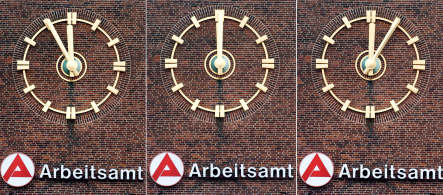But others suggest there are up to a million people without jobs who are not classified as unemployed.
“The labour market has developed in such a positive way in the past two years that we will not attain the old record levels of more than five million jobless,” Holger Schaefer of the German economic institute IW told the daily Bild.
Another expert, Klaus Zimmerman, head of the DIW institute for economic research, said that Germany “will not see five million unemployed again” during a slowdown in growth because job creation is faster than it used to be.
The government expects economic growth of 1.2 percent of gross domestic product in 2009, which will bring about a “slight improvement” on the labour market, Heinrich Alt, head of the German employment agency, told the Berliner Zeitung.
“The number of unemployed could go down by 40,000 to an annual average of 3.234 million” in 2009, he predicted, noting that there would be as many as 90,000 fewer people on the labour market for demographic reasons.
Yet about a million jobless people never show up in statistics because they are stuck in qualification and training schemes, Raimund Becker, from the Federal Employment Agency (BA) said.
He told the Rheinische Post one in four of those on such schemes fail to get a job afterwards, but that the authorities still believe in a reduction of jobless figures.
Unemployment in June fell to 3.16 million, which is around 7.5 percent of the working population.
Economy Minister Michael Glos said on Friday he did not rule out a downwards revision of government estimates for growth in 2009.
In January 2006 the number of jobless in Germany went through the five million barrier.
afp/dpa



 Please whitelist us to continue reading.
Please whitelist us to continue reading.